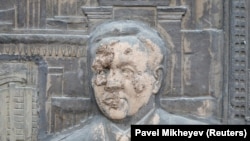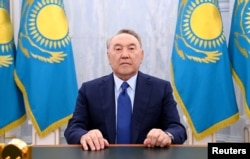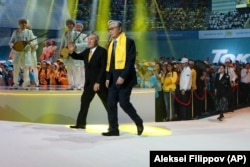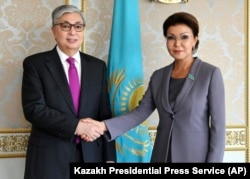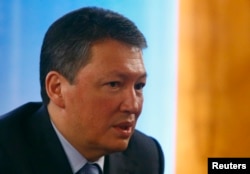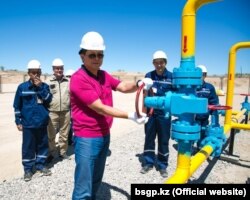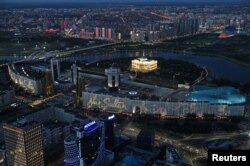His face adorns Kazakhstan’s 10,000-tenge bills and his first name has been bestowed on the country’s capital. But after riots that led to the deaths of 227 people, the Kazakh government appears to be taking steps to guarantee that Nursultan Nazarbaev, Kazkhstan’s heretofore omnipresent first president, becomes what he now says he is – just “a pensioner.”
On January 19, the Kazakh parliament, dominated by Nazarbaev’s ruling Nur Otan (Radiant Fatherland) party, approved legislation that scraps the 81-year-old former leader’s lifetime posts as chairman of the country’s Security Council and of its legislature, or Mazhilis.
These posts, by law, “now belong to the Kazakh president, based on position and not on an individual,” Nur Otan legislator Kanat Nurov commented on Facebook.
If Nazarbaev objects, he has given no public sign.
Rather, amidst calls for an end to his family’s allegedly pervasive control of politics and the hydrocarbons-based economy, the “Leader of the Nation” (Elbasy), president from 1990 to 2019, is emphasizing the authority of Kazakhstan’s elected leader, President Qasym-Zhomart Toqaev.
In his first public remarks since the January 5-6 street violence that led to his departure from the Security Council’s chairmanship, Nazarbaev, flanked by four Kazakh flags, acknowledged in a videoed speech on January 18 that President Toqaev holds “full power.”
Referring to his own supporters and those of Toqaev, he emphasized that rumors about a conflict among Kazakhstan’s “elite” amidst the unrest are “baseless.”
Nazarbaev echoed the government’s own explanations for the violence that followed peaceful January 2-3 protests over increased prices for liquefied petroleum gas and calls for his removal from power. The aim of the unrest, he asserted, was “an attack on the integrity of Kazakhstan and the foundations of the state,” and “terrorists” were to blame.
President Toqaev, in Nazarbaev’s telling, took “prompt actions” – a likely reference to his summoning Collective Security Treaty Organization peacekeepers and authorizing security forces to shoot to kill – “that ensured that the foundations of our country would not collapse.”
“It is the civic duty of all of us to extend our support to the head of state,” he concluded.
For Kazakh political scientist Qazbek Beysebaev, Nazarbaev’s remarks amounted to “an official farewell” to public affairs after being at Kazakhstan’s political helm since the late Soviet era.
“It’s as if he said, ’That’s it. I’ve already left for good. Support Toqaev.’”
The speech, Beysebaev said, signals that “the era or epoch of our Leader of the Nation has finished.”
But that does not necessarily mean that a new era has begun, other Kazakh analysts added.
“Toqaev and Nazarbaev are people from the same team,” stressed Rustam Burnashev, a professor of social sciences at Almaty’s Kazakh-German University.
Toqaev, 68, served under Nazarbaev as deputy foreign minister, foreign minister, prime minister, and chairman of the Senate before Nazarbaev appointed him acting president in 2019. He remains his predecessor’s pick to “soon” take over the chairmanship of Nur Otan.
That background means that “it’s extremely difficult to assume that there’s some kind of struggle going on between them,” Burnashev said.
Nazarbaev’s spokesman, Aidos Ukibay, asserts that Kazakhstan’s current and former presidents “were always on the same side of the barricades.” He has claimed that Nazarbaev himself offered to resign from the Security Council to quell protesters’ anger.
But theories about what occurred between the two men during the riots and afterwards cannot readily be discussed in Kazakhstan, Burnashev noted. By law, anything “that is considered a public insult or other encroachment on the honor and dignity” of Kazakhstan’s first president can be prosecuted.
Most likely, Burnashev stated, Nazarbaev remained silent about the violence that led to thousands of detentions, because there were “some talks” with Toqaev’s camp “about some [political] assets or other, about some actions that will or will not be undertaken in Kazakhstan.”
Toqaev already has begun to indicate what some of those actions might be.
Since Nazarbaev’s January 5 departure from the Security Council, he has begun chipping away at what protesters perceived to be the Nazarbaev family’s decades-long domination of Kazakhstan.
A former Nazarbaev-era prime minister and chief of staff, Karim Masimov, was removed as head of the Committee for National Security (KNB), Kazakhstan’s modern-day KGB, and detained on suspicion of treason. Analysts see Masimov as the government’s likely “scapegoat” for the January 5-6 unrest.
A Nazarbaev nephew, Samat Abish, Masimov’s first deputy chairman, also was fired from the KNB, but, unlike two deputies, Anuar Sadykulov and Daulet Yergozhin, has not been detained for alleged involvement in a supposed plot to seize power. A third deputy, Marat Osipov, also was dismissed.
But Burnashev views Nazarbaev’s “economic assets” as the most sensitive. These, he said, have not yet been affected by the ex-president’s political comedown.
These assets, ranging from shopping centers to a pasta factory, are worth “at least $8 billion” and controlled through four charitable foundations founded by Nazarbaev, according to a January 19 investigation by the Organized Crime and Corruption Reporting Project, Kyrgyz news site Kloop, and Kazakh news portal Vlast (Power).
The board chairman of the Nazarbaev Foundation, Aslan Sarinzhipov, denied that the ex-president can “withdraw money” from the Foundation, but its charter grants control over its operations to Nazarbaev, the investigation found.
As yet, Toqaev does not appear to have targeted these foundations, but, after denouncing oligarchs’ control of the economy and calling for them to share their wealth, he has taken aim at Nazarbaev family assets.
On January 19, President Toqaev ordered that the private company Operator ROP, which has been linked to Nazarbaev’s youngest daughter, Aliya Nazarbaeva, no longer be allowed to collect fees for recycling car parts and oil as well as agricultural machinery.
The company, according to the government, has received 691.9 billion tenge (roughly $1.6 billion) since 2016.
Claiming that Operator ROP’s activities have sparked “a multitude of questions” among entrepreneurs and the public, Toqaev granted its fee-collecting powers to the state-run company Zhasyl Damy (Green Development), instead.
Over the past week, two of Nazarbaev’s sons-in-law and one close associate of his eldest daughter, Dariga Nazarbaeva, also have resigned from two-state-run companies and a lobbyist.
On January 17, Timur Kulibaev, the billionaire husband of Nazarbaev’s daughter Dinara Kulibaeva, stepped down as chairman of the board of the Atameken National Chamber of Entrepreneurs, a non-profit facilitator of business-government ties. Kulibaev, rated by Forbes Kazakhstan as one of the country’s most influential businesspeople, did not elaborate about his reason for resigning.
On January 14, Aliya Nazarbaeva’s husband, Dimash Dosanov, also resigned as chairman of the board of the state-owned KazTransOil, which transports most of the country’s oil supplies.
Simultaneously, Kairat Sharipbaev, believed by some Kazakh media to be Dariga Nazarbaeva’s husband, stepped down as board chairman for the state-run gas monopoly QazaqGas.
Kazakhstan’s sovereign wealth fund Samruk Kazyna stated that both resignations occurred “in accordance [with] the requirements” of the companies’ boards.
Beysebaev views these resignations as the “conclusion” of what he termed the Nazarbaev family’s “confrontation” with Toqaev over political power.
But redefining the two men’s roles appears “completely logical” to Burnashev after Toqaev’s promises of “political reform.”
On January 11, the Kazakh leader pledged to announce this September a “new packet of reforms that will be prepared on the basis of a broad and constructive dialogue with civil society and experts.”
Nonetheless, despite Toqaev’s broad hints about economic wrongdoing, no one from Nazarbaev’s family or immediate circle has been arrested, emphasized Kazakh political analyst Dimash Adzhanov. The Kazakh president “always fences off Nazarbaev himself and members of his family,” he noted.
“Therefore, there’s no reason to talk about a seizure of power, about the ousting of Nazarbaev,” said Adzhanov. “It’s just that now Nazarbaev is retreating into the shadows.”
Speaking in Kazakh and Russian on January 18, he described himself as “a pensioner,” rather than a politician, who, since his 2019 presidential resignation, has been taking “a well-earned rest” in the capital, Nur-Sultan.
Now, even the name of that city may vanish. Since the riots, TV newscasts refer to it only as “the capital” of Kazakhstan. Online petitions to rename it Astana have attracted hundreds of thousands of signatures.
While such campaigns may have been unthinkable in the past, Kazakhstan’s “dual power” structure has ended, commented Beysebaev.
“Now, all power is in President Toqaev’s hands,” he said.
]




